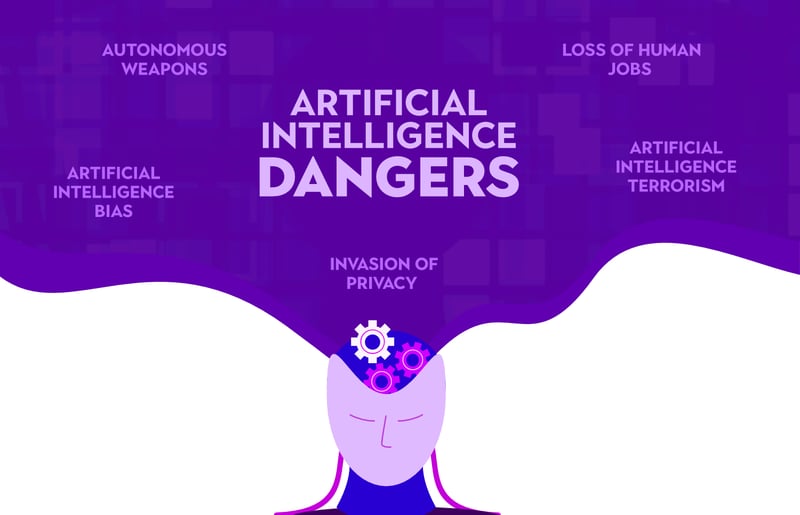
AI has been advancing rapidly lately. Nowadays, computers can do things we once thought only humans could do, like writing code, composing music, and defeating humans in challenging games. They can process vast amounts of information in an instant, making predictions about the future that would astonish us. This progress is exciting and holds the potential for incredible advancements, but it also raises questions.
Are we creating a highly useful tool that will enhance everything? Or are we developing something that could become too powerful and potentially dangerous? The answer depends on how we manage AI going forward. In this article, we'll explore the risks and benefits, speculate on the future, and discuss how we can ensure things progress positively.
Understanding AI
So, AI is rapidly becoming more intelligent, but what exactly is it? Are there different types of AI with varying abilities? Understanding these distinctions helps us determine whether AI is an ally or a potential adversary.
Narrow AI
Narrow AI is specialized to excel at a single task, becoming an expert in that specific domain. It's adept at performing one task exceptionally well, like recognizing faces in images or suggesting entertaining TikTok videos. While proficient in its assigned task, it lacks the versatility to solve a wide range of problems.
General AI
Now envision an AI with the capability to tackle any task imaginable—that's the concept behind General AI. This type of AI would possess human-like thinking and learning abilities, capable of addressing any problem thrown its way. While this sounds like science fiction, General AI remains theoretical for now. However, our progress towards this goal raises concerns.
AI is already ubiquitous! It recommends movies on your phone, enhances your photos, and assists doctors in analyzing medical scans. It's accomplishing remarkable feats. But like any tool, AI isn't flawless. Sometimes, these specialized AI systems can exhibit biases. For example, consider a program that determines loan approvals. If it learns from biased data, it may unfairly favor certain individuals. Additionally, AI can be susceptible to hacking. Just like a computer, a skilled hacker could manipulate AI systems into making poor decisions or extracting sensitive information.
Understanding the various types of AI and their weaknesses enables us to utilize them for good while mitigating potential risks. We can ensure AI becomes an ally rather than a foe!
AI for Good
Now, let's explore how AI is already making a positive impact on our world!
AI Revolutionizing Industries
AI is revolutionizing numerous industries, making processes faster, smarter, and even life-saving! Here are some examples:
- Healthcare: AI can analyze medical scans with remarkable precision, assisting doctors in detecting diseases earlier and recommending optimal treatments. Imagine AI spotting a tiny tumor in an X-ray that a human might overlook!
- Transportation: Self-driving cars powered by AI have the potential to revolutionize transportation, enhancing road safety and reducing traffic congestion. Envision a future where you can relax during your commute instead of battling rush hour traffic!
- Manufacturing: AI can optimize factory processes, minimizing waste and ensuring products meet the highest quality standards. This results in more efficient production and potentially lower prices for consumers.
These examples merely scratch the surface, and the possibilities are endless! AI has the potential to enhance countless aspects of our lives.
The Challenges of AI
However, AI also presents challenges:
- Fairness and Privacy: AI algorithms can become biased if trained on biased data, potentially leading to unfair decisions in areas like loan approvals or job applications.
- Privacy: AI systems often require vast amounts of data to operate effectively, including personal information such as faces, voices, or browsing habits. It's crucial to ensure this data is secure and used responsibly to prevent breaches or misuse.
- The Job Market Shuffle: While AI automation may replace some jobs, it's also likely to create new ones. The key is to prepare for this change and ensure people have the necessary skills to thrive in an AI-powered future.
We've witnessed the potential of AI for good, but also the challenges it presents. So, how do we ensure AI becomes a force for progress while minimizing risks?
Building Safeguards: Regulations and Oversight
Strong regulations and oversight can ensure that AI is developed and deployed ethically, does not discriminate, respects privacy, and is used safely and securely. Governments and tech companies must collaborate to establish these safeguards and ensure universal compliance.
Setting Standards: Ethical Frameworks for AI
Just as doctors adhere to a code of ethics, clear guidelines for AI development are essential. Robust ethical frameworks can ensure AI is used responsibly for the benefit of society, considering factors such as transparency, accountability, and human control.
A Global Effort: Fostering International Collaboration
AI is a global phenomenon, and its challenges and opportunities transcend national borders. International collaboration is vital to ensure AI is developed and used responsibly for the benefit of humanity. This collaboration involves sharing knowledge and expertise, addressing global challenges, and establishing common standards.
Future of AI: What's Next?
The future of AI hinges on finding a balance between harnessing its potential and mitigating risks. Here's what we can expect:
- AI on Fast Forward: AI technology will continue to improve, leading to even more remarkable advancements.
- Ethics First: As AI develops, ethical considerations will become increasingly important. Strong rules and guidelines are necessary to ensure responsible AI use.
- Learning New Skills: With changes in the job market due to AI, there will be a need for new education and training programs to equip people with the skills needed for the future.
- Working Together: Global collaboration will be essential to address the challenges and opportunities presented by AI.
The ultimate impact of AI on our lives depends on us. By proactively addressing challenges and focusing on ethical development, we can ensure AI becomes a powerful force for good, creating a brighter future for everyone.
Conclusion
AI is powerful and can change our world for the better. It can help doctors, make transportation safer, and even fight climate change. But there are also some challenges, like job losses or unfair decisions. To make sure AI helps us all, we need to work together. Scientists, governments, and even regular people all need to be involved to make sure AI becomes a tool for good, not something scary. The future of AI is up to us!






Top comments (0)